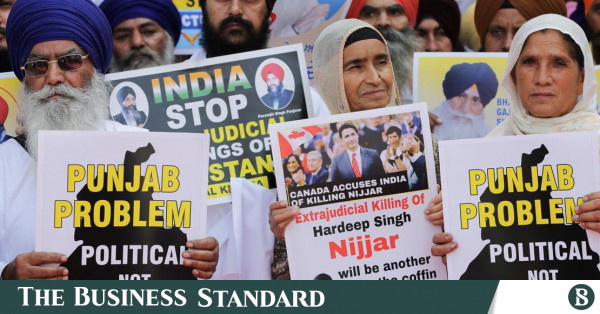Canadian Prime Minister Justin Trudeau told Parliament earlier this month that there could be a link between the Indian government and the killing.
Protesters held signs demanding, among other things, “true answers” from Prime Minister Narendra Modi after Canada alleged the Indian government was involved in the killing. Image: Reuters
“>

Protesters held signs demanding, among other things, “true answers” from Prime Minister Narendra Modi after Canada alleged the Indian government was involved in the killing. Image: Reuters
Hundreds of Sikh activists staged a protest outside the Golden Temple in Amritsar, in the northern Indian state of Punjab, on Friday to demand punishment for the killers of a Sikh separatist shot dead in Canada.
What were they protesting about?
Hardeep Singh Nijjar was shot and killed in July this year in the parking lot of a Sikh temple in British Columbia, a quarter of a century after leaving India following the death of his father, also a Sikh separatist leader .
Canadian Prime Minister Justin Trudeau told Parliament earlier this month that there could be a link between the Indian government and the killing. Nijjar was declared a terrorism suspect by India in 2020.
This sparked harsh reactions from India, which called Ottawa’s allegations and plans for an investigation “absurd”.
The Hindu nationalist government of Narendra Modi temporarily suspended visa processing for Canadians and issued a travel warning either for Indians in Canada or people planning a trip there, apparently in response to the accusations. Both countries sent a diplomat to their home, in a tit-for-tat approach.
Canada has yet to provide evidence to support its suspicions, but Trudeau said, when challenged, that his government’s decision to go public with its suspicions was not “taken lightly.”
The country is home to both a large Indian diaspora and a large Sikh community migrating from India.
Demonstration at the holiest site in Sikhism
Holding posters of Nijjar and placards often with slogans in English, the demonstrators called on Delhi to end extrajudicial operations against separatists seeking an independent state in Punjab or in part of this Sikh-majority region that spans the border between India and Pakistan.
“It is timely and timely for New Delhi to speak with Sikh leaders,” said Paramjit Singh Mand, a leader of Dal Khalsa, the group that advocates for a separate Sikh homeland and organized the protest.
Sikhs make up just under 2% of India’s population, according to the latest government census, with Sikhism the fourth most common religion in the country after Hinduism, Islam and Christianity. However, Sikhs also make up the majority of the population in the Punjab region of northern India and southern Pakistan. Some seek to create an independent nation known as Khalistan, located on all or part of this territory.
Canada’s allegations and New Delhi’s harsh response have thrust an often-forgotten issue back into the international spotlight several weeks after Nijjar’s death, with relatively muted media coverage outside Canada.
“We thank the Canadian government for exposing the Indian design, the way India operates on foreign soil and intervenes in Canadian affairs,” said Kanwar Pal, the group’s political affairs secretary.
Indian foreign minister says he raised issue during US visit
Meanwhile, Indian Foreign Minister Subrahmanyam Jaishankar was just south of Canada’s borders on Friday, visiting Washington DC.
He said he discussed the issue with US Secretary of State Anthony Blinken and US National Security Advisor Jake Sullivan during his visit.
Speaking at an event at the Hudson Institute think tank, Jaishankar said: “They shared the views and assessments of the United States on this whole situation, and I explained to them in detail… a summary of my concerns.”
A U.S. State Department report on the visit made no mention of the issue, but a U.S. official confirmed Thursday that Blinken had discussed the matter with Jaishankar and urged India to cooperate with the Canadian investigation.
“Our response to (Trudeau), both privately and publicly, was that what he was alleging was not consistent with our policy,” Jaishankar said. “And if his government had something relevant and specific that he would like us to look at, we were willing to look at it. Now, that’s where this conversation is at this point.”
He described the subject as “an issue of great friction” in India’s ties with Canada for many years, an issue that for a time “went dormant”, but which has erupted again over the in recent years, “because of what we see as There will be a very permissive Canadian attitude towards terrorists, extremists and people who advocate violence. »
Jaishankar said these people from India were given “operational space” in Canada.


